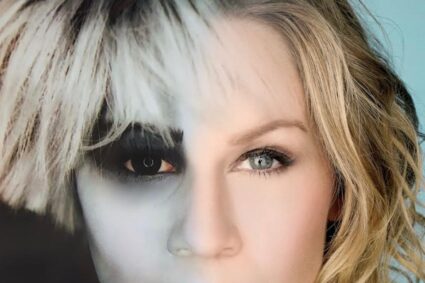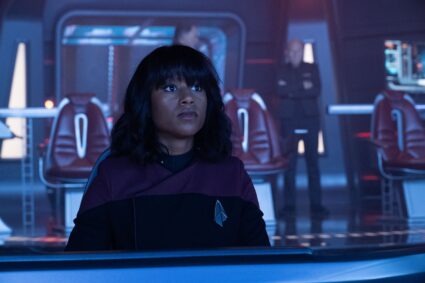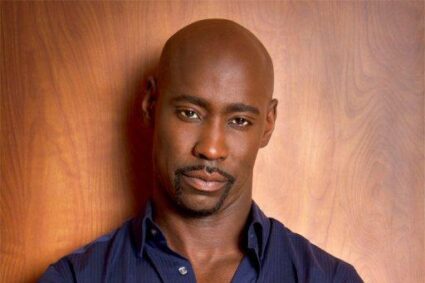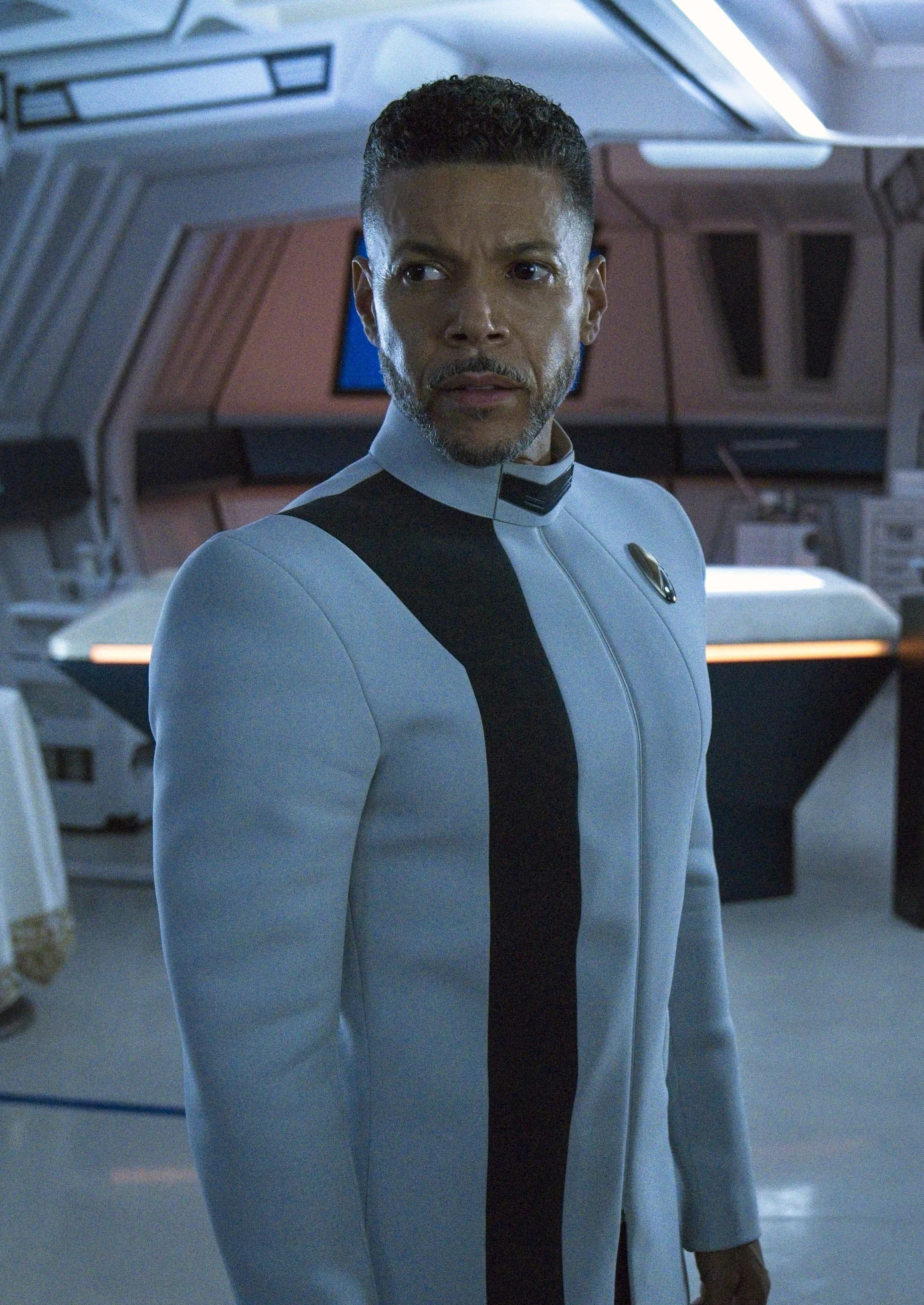
Photo Credit: Michael Gibson/Paramount+
On this Special Farpoint 30 Edition of THE INTERVUE, our guest tonight has quite the resume. I am so honored to be talking with him today of all great days. He started his career in 1994 playing Rickie Vasquez says on the critically acclaimed series “My So-Called Life”. He has gone on to greater things with TV stints in Red Band Society, “Party of Five” and “10 Reasons Why” and to movies like “Supernova” & “Party Monster”.
And he is also on the stage he has been in “A Perfect Wedding”, “Tick Tick Boom” and playing Angel in one of my favorite musicals, “Rent”. But for those countless Star Trek fans, myself included out there, he is Dr. Hugh Culber on Star Trek: Discovery, which is currently playing on Paramount+.
And for those fans who are in the DMV, he is going to be one of the four guests that’s coming Farpoint 30. That’s right, Farpoint celebrates its 30th anniversary this year, and he’ll be coming to town this week February 10 – 12 at the Delta Hotel by Marriott Hunt Valley, Maryland.
Ladies and gentlemen, I have with you the one, the only Wilson Cruz!
Wilson, its an honor to be talking with you on THE INTERVUE!
Thank you for having me. It’s a pleasure to be here with you.
Star Trek: Discovery has been firing on all cylinders and has jumpstarted the Trek television boom that we have been seeing since 2017. My first question to you is what has piqued your interest in playing Dr. Hugh Culber and how has he evolved throughout the four seasons we have seen so far.
You know, he has I mean, he not only has he as a character evolved, but more my experience playing him has also been an evolution because as everyone knows, at this point, I started out as just a recurring character. I was just basically Mr. Stamets’ boyfriend for most of the time for the first season, until the terrible, terrible thing happened. And believe it or not, for me, that was really where it began like it, that’s where, for me, we really began to figure out who this person is because he needed to figure out who he was, in order to come back to life in order to find his way back to Paul.
And so, it was through the process of being reborn, and finding out for himself what it means to be in the world again. And to have a second chance to live that he started to understand what was important to him and what wasn’t. And as an actor, it was really fun to figure out what those things were, how to play them, and how to create a three-dimensional person. And so, with the writers and the producers and the show runners, we really started to understand that the beating heart, if you will, of this crew that he was very much in tune with the emotional roller coaster that these people have been on, and has been really willing to step up and guide them through it.
The fact that he died and came back, gave him some gravitas in in the eyes of this crew that allowed them to trust him in a way that they hadn’t even trusted that they hadn’t trusted him before. So, short answer to I gotta make it succinct. The entire storyline has been about evolution, it has been about evolving into the person that you want to become, and being in the driver’s seat of your life, not being driven by your circumstances. But taking advantage of the circumstances that you find yourself in to create the kind of life that you deserve. And that’s how I think that’s how I see him.
I definitely applaud you for the answer. It’s like the Tasha Yar syndrome, she had to die on her series in The Next Generation in order to get the best episodes. And your character has really evolved, from a background character to playing one of the main characters, especially going through life, death, and reborn.
And now you’re doing double duty, not only as the doctor, but you’re also the ship’s counselor, especially since the crew went from their home century to the 32nd century. I love the fact that he got to give some advice to the crew with Saru, to encourage them to have that crew dinner that went berserk to the movie time we have seen. How did you prepare to do double duty by playing a ship’s doctor and a counselor looking after the crew’s mental health?
For me, I feel like by the time we arrive into the 32nd century, as a species, I hope that by then the medical world will own the fact that we aren’t just a series of blood vessels and organs. If we are going to look at a person’s health that we need to look at it in a holistic way that their mental health is as important as their physical health and how do those two things work together, in order to make a person healthy and able to, you know, walk through the world and get all of the things done that they need to do. And the minute we start looking at people in a holistic way, and own the fact that person’s mental health is just as important. I think we start to really heal people, we really start to get to the crux of whatever their issue is.
I think Hugh understands that in a in a personal way. And because he saw himself through his own trauma, he if he could identify the trauma that his fellow crew members were experienced and really needed to step up in a way that only he could do. I think he also understood that he had the kind of relationship with his crew that would allow them to go through that process with him specifically. Also, it’s just for me as an actor, those scenes are my favorite scenes. To have one on one conversations, in depth conversations with these other people, these other characters and get them to a good place with who and where they are. That’s interesting material to play.
The first person that I really got to go in with was, was David Ajala. To develop, what Culber’s therapy session style is with that level of actor was really a gift. And to follow it up with Mary Wiseman, and talk to Tilly and find and help her focus and see what’s important to her. Those two experiences with those therapy sessions really helped me understand what kind of a therapist, Dr. Culber is. He’s not just an empathetic person, but he’s someone who walks into these sessions with a goal, right? He doesn’t walk into them blindly. He knows where he wants to get with them and what he where he wants them to get with him. He has a finesse about him. A big beating heart that allows people to trust him. It’s been exciting for me!
It’s been amazing to watch you to tell you truth is especially the last couple of seasons
I’m really looking forward to people seeing Dr. Culber and season five, because we get to see so much. We get to see even more of a fuller picture of who he is in in. And there are our new sides to him that are exciting for me to discover. And I think we’re going to be great for people to watch.
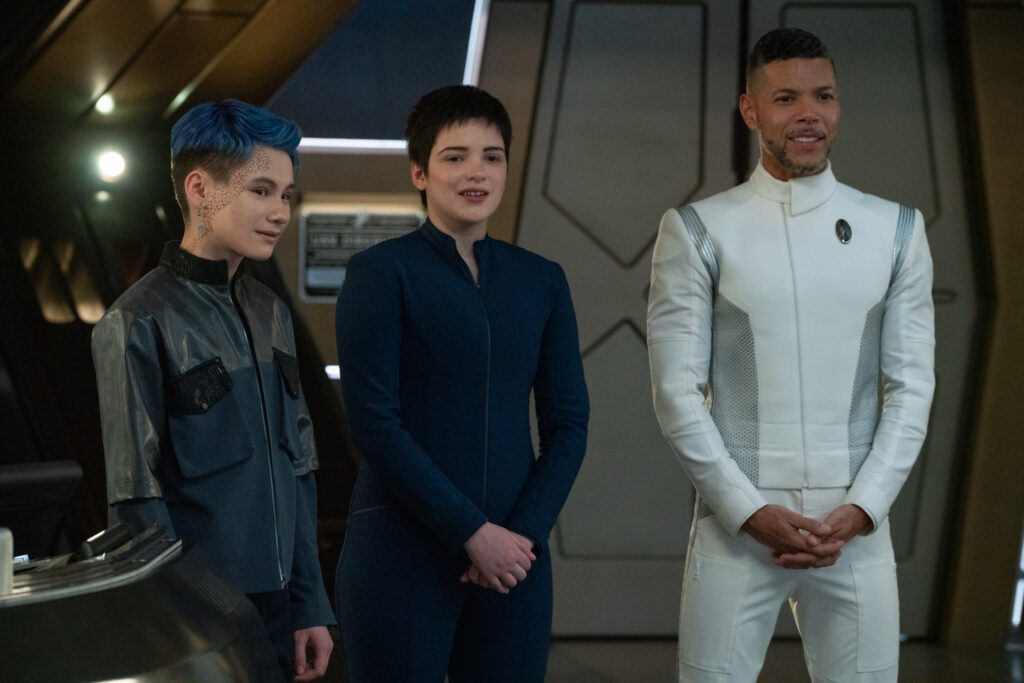
Why definitely cannot wait, especially since he’s really evolved in the last couple of seasons. Since you touched on the scenes you shared with David and Mary, the one thing that I love about Hugh is the chemistry with Anthony as Paul, but also working with Adira and Grey play by Blu (del Barrio) and Ian (Alexander). It brings this new dynamic of family that only Star Trek can give the positive light that we need to see as society. And I want you to talk about how that development of this found family progresses during season four. Did you experience any hiccups or conflicts to make sure it’s portrayed right and as portrayed well?
You know, I think that so much of it kind of came about naturally from out from Anthony and I’s relationship with Blu & Ian. There was a natural mentoring relationship between these two queer actors with these two older queer actors who also started out as young people in this industry. And so, we felt like we really wanted to protect them, but also set them up for success. I think that dynamic was really interesting to the writers. And so, it just kind of developed very naturally.
And that’s what I love about it because I think that’s how found families are created right? They start out as someone you know, into someone you can’t live without. That someone who informs your life in ways that you didn’t even know you needed. And for Anthony and I, you know, I’m not a dad now, but you know, my friend now is. Up until then, I think there was something that we that we wanted to nurture in ourselves that we were being responsible to our young queer actors who were having a new experience.
We wanted to ensure that it was a better experience than we had when we were young and queer in this industry, which was hard. I love seeing how that has played out in in the show, because in very similar ways, our relationship with Blu and Grey is about allowing them to live up to their potential as crew members on this ship. We’ll continue to see that as the seasons progress.
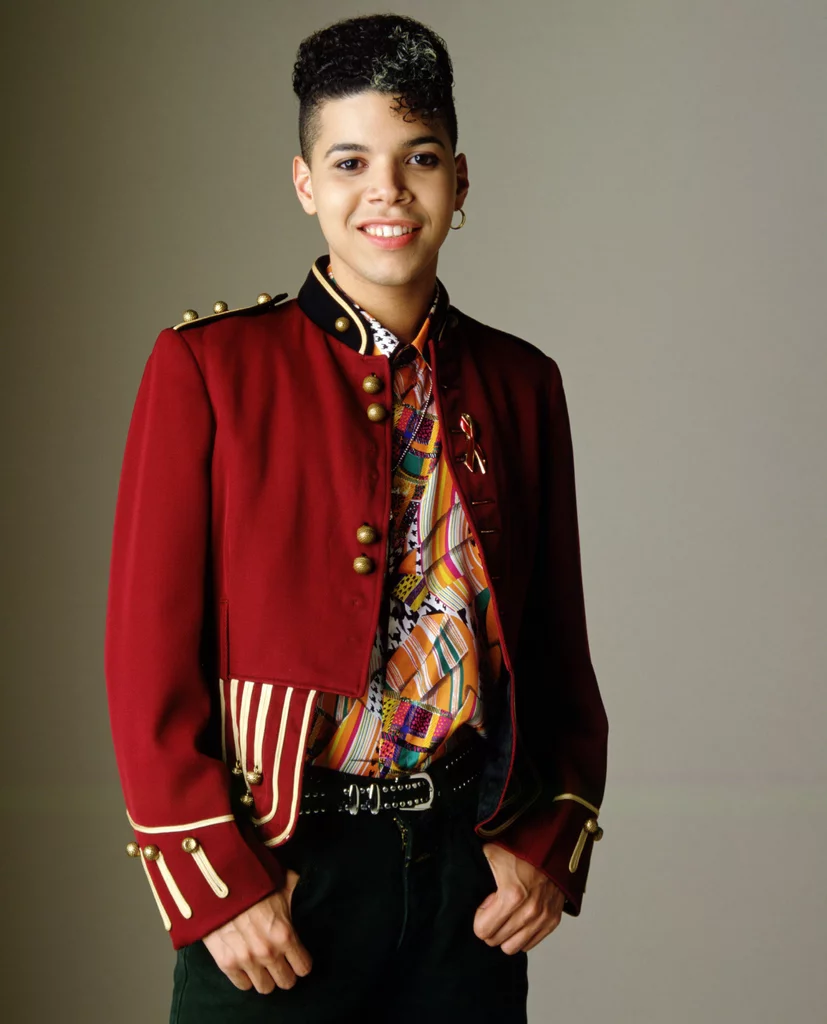
It seems like it’s passing the torch for because almost thirty years ago, with your role as Rickie in “My So-Called Life”, it was just nineteen episodes still has a great following. And you are the first openly gay actor to portray an openly gay teen on network primetime television. I want to know, after almost thirty years now, what does Rickie mean to you now, and the legacy that you have brought to the world that you have set a path for gay actors & characters today?
No, but you know, I hear you think, first of all, thank you for it for that question. Not only did I play the first, when not only was the first actor to play an openly gay teenager, I was the first openly gay actor to play any openly gay role. So, it wasn’t just teen. I only say that because it’s still amazing to me that it took up until 1994 for that to happen. I didn’t even know at the time that that was true. We didn’t realize that or I didn’t realize that until I was researching my own documentary series called Visible: Out on Television, which is on Apple TV+. During the research for that documentary series is when we found out that the person that I was trying to find out like who was the first person it was actually me.
So what does it mean to me, it means it means and has always meant everything to me, because Rickie Vasquez. People come up to me, if not daily than weekly, but at least online daily, someone will come up to me to tell me how important he is to them and what he meant to them in their journey of self-acceptance and identity. My very first thought is, he changed my life. I had to become the kind of person who was worthy of playing Rickie Vasquez. I knew I knew that when I took on the role that I was going to have to be out that I was gonna have to talk about that publicly.
I had to put all of the pieces in place in my personal life in order to make that happen, which also included coming out to my parents and that experience ended up in forming the character. So there was this very symbiotic relationship between me and Rickie Vasquez. I know that no matter what I do, you know, whether it be Hugh Culber, or Dr. Juanito Vargas on “Noah’s Arc” or Angel in “Rent”, I’m always going to be Rickie Vasquez and that’s fine with me more than fine. I’m proud to carry the mantle, if you will of that because I think for so many of us epitomize how troublesome are our youths were in that period of time in history.
The 90s were this very exciting time, in terms of political power, that came through visibility, but it was also a time in which we were losing our young men in numbers that are hard to imagine today to AIDS. So, there was a lot going on. And Rickie kind of allowed us to see that journey and appreciate it and learn from it and be inspired by it. And that’s what he continues to do for me even today.
Now I’m gonna have a tough time asking which next question I want to ask because you touch on two important things I really want to ask about. Since I can tell you speaking of Angel, “Rent” is one of my favorite musicals of all time. I’m glad you have the honor of portraying Angel. And I can tell you, honestly, I’m trying not to cry but now thinking about it, how Angel’s death when it was portrayed on stage and in the film, it reminded me so much of my mother, because lost my mother to AIDS twenty-five years ago now.
So sorry
Thank you, and you played such characters on film and television. What changes have you seen within the industry regarding the inclusion of actors and actresses of color, and of the LGBTQ+ community and how they’re portrayed from the 90s to where we are right now, in 2023?
You know, I think when we look back at the roles, the queer roles back in the 90s, and in the, even in the 2000s, so much of that storytelling was an attempt to reach people, to get them to empathize and to understand us as a community. And that was important, it continues to be important. The stories we tell whether they be on film, or in the theater, or, on big screens or small, allow people in their homes, or in their personal experiences, to walk a little bit in our shoes and try our lives on for a bit and empathize with what our experience has been. And that is incredibly important.
I think now, in 2023, our community has earned the right to ask for more joy, for stories that have less to do with our traumas, and more to do with our victories, and our loves and our relationships and more stories for us, by us because we deserve that. I think we find ourselves in this moment, kind of navigating between stories that still inform and invite people in, and stories that allow us to see ourselves and take stock of our experience. I am definitely one who is advocating for more queer joy in our storytelling. I hope to be a part of that.
And you are a part of it right now, within Star Trek. I read that you are a big yoga person. How does yoga help with your soul and with your center?
Oh, I can’t start my day. First of all, my back won’t allow me, my 50-year-old back won’t allow me. o much of my work really is about connecting with other people and finding that connection in order to tell a story. So much of my advocacy is about speaking out for those who can’t speak for themselves. My yoga practice is about “How do I get in touch with me?” “What do I need in this moment?” “How am I well, how am I not well?” “What ways can I help myself manage a crisis better?”
There’s a power in in acknowledging your own breath and being grateful for it in the moment, that’s what yoga does for me. It also allows me to recover from my heavy lifting days in a way that allows me to go back to the gym and feel some progress. I’ll be 50 this year and I feel it every time I go to the gym, I’m like, “oh, yeah, this is harder now”. My yoga practice is about centering myself and it does that in meaningful ways. I honestly can’t go to work until I do it right. I have to be centered in myself so that I can show up fully for my scene partner when I’m when I’m in that scene.
I have to admit, I’m jealous of you because when I looked at your Instagram, you recently went to France, posted beautiful shots. If you were to recommend tips for me for my upcoming trip to France, which I’m hoping to do, in a couple years or so, what advice would you give me to have an amazing trip?
Well, I don’t know how long you’re going for, but I will say this, the thing that I loved about my trip was that I got to spend a good amount of time in Paris. And do that, right, like do Paris and see the big sights and be a tourist there. I also was there in France long enough that I could get out of Paris and see some of the countryside, I took a train ride with me and my brother and my brother-in-law, my nephew, to Strasburg. It’s a beautiful ride, we went to the Christmas market there, then we took another train to Colmar. And we went in, check that out. And then I spent a week in to new Liban, which is near Lake Geneva. And we were there for a week, I went to the baths.
And then on our way back to Paris to go to the airport, we stopped in another town called oz there. All of that to say, I really got a real a larger view of France, not just the Metropolitan France, but rural areas and small towns and these old cobblestone streets and these homes that have been there for older than the United States that itself. I really got a perspective of the of the country and enough to make me want to go back and explore you in more. I would, advise you to get out of the metropolitan areas and kind of experience some of the country. Walk, walk everywhere, I walked everywhere in Paris.
You’re right about that. I did the same thing when I went to England my first and second time that even though my friend lives in Hertfordshire & Coventry, the times I was there, I was able to see a whole lot more of the countryside, experience the culture instead of just being in London for the entire seven days. I got to experience this whole site and it gave me such an appreciation for England that I never thought I would experience.
That’s the way to visit a place I think I really think it’s like on your feet and get out of metropolitan areas and experience real the real country the real people.
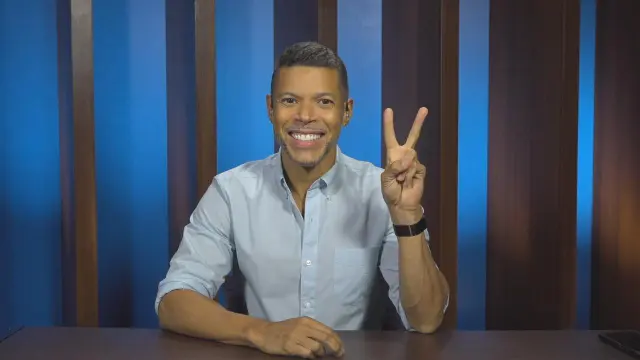
Now you and I have a commonality and it has to do with Meredith Vieira, you have been on “25 Words or Less” as the celebrity. I actually was on Who Wants to Be a Millionaire.
Yes. I love Meredith. She just had a birthday just last month, but I just love her to death. She’s just good real people, right? I could hang with her there and she puts on no airs.
Not all, especially when I met her. I think it was about five or seven years afterwards. And I told her it’s great to see you again. You helped me win 64,000 And she gave me the biggest hug that she’s ever given me.
Yeah, I love a game show. And I actually did a bunch of a bunch more of “25 Words or Less”. I think there’ll be airing in like March or April, but we made them last year. Yeah, I love that game.
Are you a big fan of game shows and games in general when it comes to playing or being a contestant?
I love a board game like you know, I was babysitting my nephew this morning and he has these card games.
So in about a month, we are going to experience your presence at Farpoint 30th anniversary, the second weekend of February or what are you looking forward to being here at Farpoint coming up in a month?
Well, from what I understand, it’s not quite run. Like other conventions, it’s a little bit more European in the way that they run it. I’m looking forward to that. And experiencing that. I honestly, like my favorite part is just the one-on-one conversations I get to have with fans, I love to hear their thoughts on the show. I love to hear what they love what they don’t love. I love to hear it. And as you know, our fans love to share that they have no problem sharing all of their thoughts. I think there is value in hearing from your audience, what’s working, what’s not working, what they what they liked, what they don’t like. We might agree, we might disagree. I like to take all of that with me when I go back to work. I love conventions. I’m into it.
So my last question is this. I know we can talk forever about a lot of things. What would you like to say to your fans who have supported you throughout your career from My So-Called Life to Rent to Star Trek Discovery to whatever the future brings for you?
I mean, listen, it is not lost on me that there was nothing in my story as a young person, to lead me to believe that I would be so fortunate to have a career that has spanned thirty years. When I when I first did “My So-Called Life”, I was like, if this is the only thing I ever get to do, it will have been enough. So, everything after that has been a gift. Hugh Culber has been the most fascinating, complex, shockingly surprising character I have played to this day, he continues to surprise me. And I’m just grateful to people for going on this ride with me on my personal ride as an openly gay actor, to continue to have this career but also that they’ve gone on this crazy Hugh Culber roller coaster and that they’ve got they’ve gone all in with me. You have to suspend all kinds of disbelief with this guy. And I do my best to make it as real and believable as I possibly can.
Stay tuned later this week as I bring my interviews with Carlos & Rylee Alazraqui
For more information or to purchase tickets, go to farpointcon.com
Star Trek: Discovery seasons 1 – 4 are available on Paramount+
